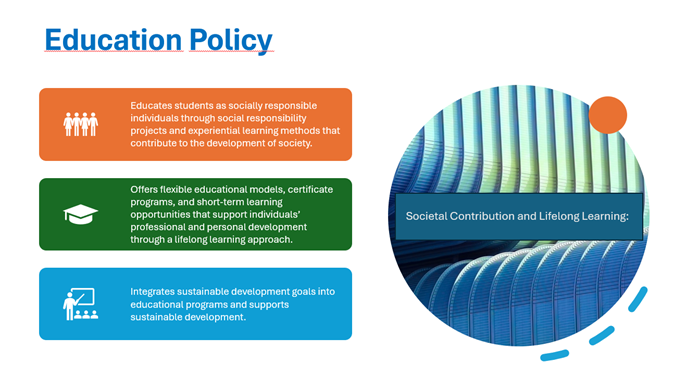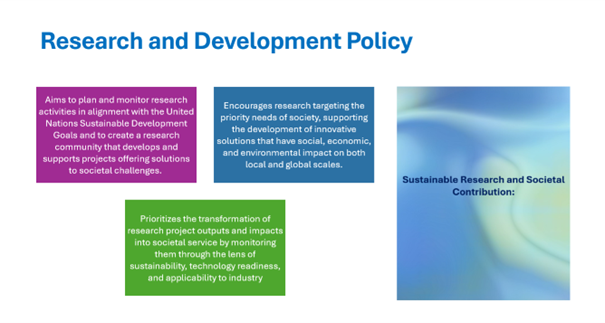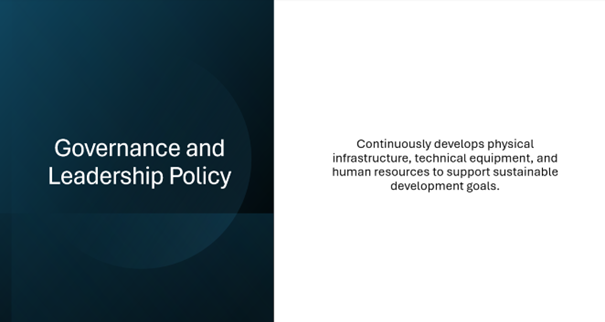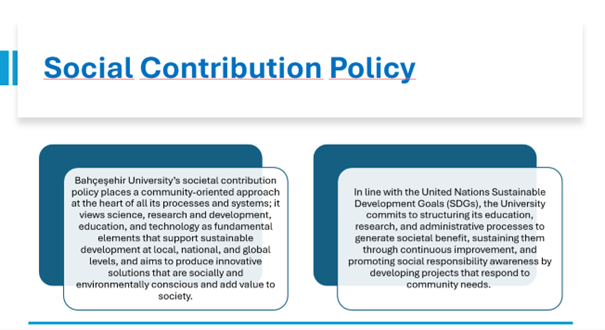Bahceşehir University –Bahçeşehir University - Policy and Commitment for Integrating Sustainability & Sustainable Development Goals Education
The image below shows the ways in which Bahcesehir University integrates the United Nations Sustainable Development Goals (SDGs) into its governance, education, and research activities.
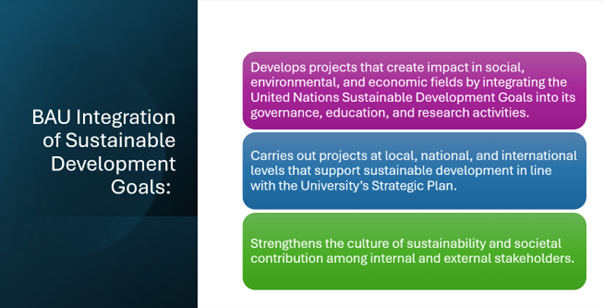
Institutional Commitment
Bahçeşehir – Bahcesehir – University (BAU) places the United Nations Sustainable Development Goals (SDGs) at the core of its institutional mission — embedding sustainability into teaching, research, campus life, and external engagement.
The university affirms that every student, irrespective of faculty or discipline, graduates as a responsible citizen equipped with the mindset, tools, and agency to drive a sustainable and equitable future.
Sustainability education is not limited to a single faculty or department; it is a cross-cutting commitment embedded throughout all academic programs at BAU. Every student is guaranteed exposure to sustainability principles and SDG-linked learning outcomes as part of their formal education.
Governance Structure
Sustainability strategy and implementation are overseen by the Social Impact & Responsibility Commission, operating under the Rectorate and composed of academic, administrative, and student representatives. The Commission develops policy, monitors progress, ensures accountability, and fosters stakeholder participation across BAU’s ecosystem.
Key Policy Components
Holistic Education:
All BAU programs include sustainability-oriented content through experiential, problem-based learning that engages students in real-world challenges, promoting systems thinking and global awareness.
Curriculum Integration:
SDG-relevant themes are systematically incorporated in courses across all faculties and levels — ensuring that sustainability is not isolated but omnipresent in the academic structure.
To strengthen this integration, BAU implements the following measures:
Research & Innovation:
BAU prioritizes research that tackles sustainable development, encourages interdisciplinary collaboration, and channels academic output into policy and practice.
Student Engagement & Impact:
Volunteering, student-led initiatives, service-learning, and social entrepreneurship are institutionalized, enabling learners to move beyond theory into practical, community-based action.
External Partnerships:
BAU collaborates with governments, NGOs, industry, international agencies, and civic actors to co-create programs, share data, scale best practices, and expand its societal reach.
Implementation & Monitoring:
Awareness & Capacity-Building:
Regular seminars, workshops, campaigns, and educational resources engage students, faculty, and staff in the SDG agenda and build sustainability fluency.
Data-Driven Metrics:
The university systematizes data collection on SDG-linked teaching, research, and engagement activities, using dashboards and annual reports to track outcomes and drive continuous improvement.
Accountability & Transparency:
BAU publishes progress updates, participates in national/international networks, and fosters open dialogue regarding its sustainability performance and institutional challenges.
Outcome & Vision:
By institutionalizing sustainability across its core functions — learning, discovery, engagement, and operations — Bahçeşehir University shapes graduates who act as change agents, contributes to societal transformation, and aligns its academic mission with the SDG agenda. In doing so, BAU positions itself not merely as an educational institution but as a catalyst for sustainable development and inclusive progress.
Through an integrated curriculum that includes both mandatory and elective sustainability components, BAU ensures that every student develops the knowledge, values, and competencies required to lead transformative change toward a sustainable future.
Created: 2021
Updated: 2024
Bahcesehir University (Bahçeşehir BAU) has elevated its institutional commitment to sustainable development by integrating the principles of sustainability and the United Nations Sustainable Development Goals (SDGs) across all of its core policies — including governance, education, research and development, and social impact.
This comprehensive approach ensures that sustainability is not treated as a separate agenda but as a foundational value guiding every aspect of the university’s strategy, operations, and decision-making processes. Through this integration, BAU demonstrates its dedication to cultivating a culture of responsibility, innovation, and inclusivity within both the academic community and society at large.
The images below show how Bahcesehir University integrates sustainable development principles into its main institutional policies, including education, research and development, social impact, and governance.
